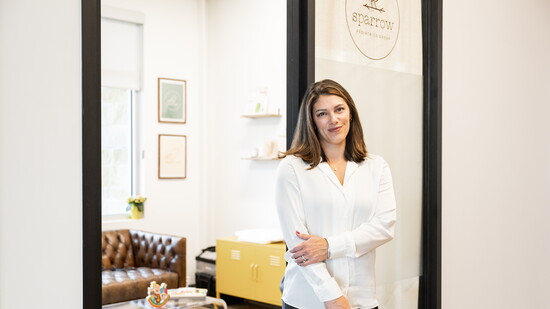Have you ever spent time with a baby and felt a surprisingly deep connection, without a single word spoken? Babies can’t explain to you how they feel or have a conversation about their thoughts, yet they often connect through something more powerful: curiosity.
In my office, it usually begins with a baby quietly watching me from a distance. Then comes eye contact, a cautious smile, and soon they’re reaching for my stethoscope—touching, tasting, passing it back and forth. After a few rounds of peek-a-boo and waving bye-bye, we are fast friends. Long before they can speak or move freely, babies are wired to discover their world, and that includes discovering people. They’re exploring.
One of the joys of being a pediatrician is witnessing this incredible growth over the course of my time with patients and their families. In a child’s first two years, development is fast and full of wonder. Newborns sleep through our first visits, but at just two months old, they start to coo and smile. By four months, they’re rolling over. At six months, they’re already trying solid foods. By nine months, they are crawling, babbling, and grabbing everything in my office. And by two years, they’re opinionated, energetic, and uniquely themselves. The rapid explosion of new milestones and changes during this short period of time is miraculous.
Then—blink—they’re navigating friendships, emotions, and identity throughout adolescence. But no matter the stage, one truth holds: Children learn through exploration. They don’t sit quietly in lectures or listen to podcasts; they play, climb, taste, listen, and ask questions. As parents, grandparents, and mentors, it is our job to cultivate this natural desire in a way that is meaningful and safe.
How Can We Support Children in Their Exploration?
Be a Co-Explorer
Let them see you trying new things. Explore nature together. Try unfamiliar foods. Be vulnerable and ask curious questions. Show them that learning and discovery are lifelong adventures not just for the young.
Be Present
Put away the distractions and technology. Tune in and listen. That constant stream of chatter from your preschooler is not just noise; it’s learning in real time. Watching their minds light up as they play and discover the world around them is truly a gift.
Be Patient
Exploration is messy. Paint will splatter; knees will be scraped; hands (and kitchens) will get dirty. And that’s okay. These moments are signs of healthy, hands-on learning. This season is short—embrace the beautiful chaos while it lasts.
SparrowPediatricsGroup.com | @sparrowpediatrics
